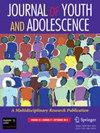成年初期的应对概况与功能:一项以人为中心的纵向比较研究。
IF 3.6
1区 心理学
Q1 PSYCHOLOGY, DEVELOPMENTAL
引用次数: 0
摘要
年轻人使用多种应对策略来应对挑战。然而,有限的研究集中在这些组合上,因为它们在不同的青年概况中有所不同,在成年初期的主要生活转变中也有不同的含义。为了解决这一差距,本研究以人为中心,对这一时期应对状况的性质、稳定性、预测因素(压力生活事件、性别)和结果(影响、生活态度、身体症状)进行了评估。参与者来自具有全国代表性的瑞士初成年样本(n: 1845; 58.53%女性;Mage = 19.44; SDage = 0.62),包括学生(n = 873)和工人(n = 972)的子样本。随着时间的推移,六个特征在子样本中重复:(1)情绪和回避(18.3-25.8%),(2)情绪导向(8.7-10.4%),(3)不应对(2.5-3.0%),(4)任务和回避(12.7-16.1%),(5)平均(28.1-41.7%)和(6)任务导向(6.8-25.7%)。侧写隶属度由性格(性别)和情境(生活事件)因素预测。任务导向的档案显示出最积极的结果,而非应对和情绪导向的档案显示出最消极的结果。这些发现揭示了年轻人所表现出的可概括的应对特征的本质,并确定了任务导向的特征是最适合管理成年初期的主要生活转变的。本文章由计算机程序翻译,如有差异,请以英文原文为准。
Coping Profiles and Functioning During Emerging Adulthood: A Comparative Person-Centered Longitudinal Approach.
Young adults use a combination of coping strategies to deal with challenges. Yet, limited research has focused on these combinations, as they differ across different profiles of youth and their implications during the major life transitions of emerging adulthood. Addressing this gap, the present longitudinal person-centered study assesses the nature, stability, predictors (stressful life events, sex), and outcomes (affect, attitude toward life, physical symptoms) of coping profiles during this period. Participants were drawn from a nationally representative Swiss sample of emerging adults (n: 1845; 58.53% females; Mage = 19.44; SDage = 0.62), including subsamples of students (n = 873), and workers (n = 972). Six profiles were replicated over time and across subsamples: (1) Emotion and Avoidance (18.3-25.8% of the sample), (2) Emotion-Oriented (8.7-10.4%), (3) Non-Coping (2.5-3.0%), (4) Task and Avoidance (12.7-16.1%), (5) Average (28.1-41.7%), and (6) Task-Oriented (6.8-25.7%). Profile membership was predicted by dispositional (sex) and situational (life events) factors. Task-oriented profiles displayed the most positive outcomes, whereas non-coping and emotion-oriented profiles, the most negative ones. These findings shed light on the nature of generalizable coping profiles displayed by young adults and identify the task-oriented profiles as the most adaptive for managing the major life transitions of emerging adulthood.
求助全文
通过发布文献求助,成功后即可免费获取论文全文。
去求助
来源期刊

Journal of Youth and Adolescence
PSYCHOLOGY, DEVELOPMENTAL-
CiteScore
8.20
自引率
6.10%
发文量
155
期刊介绍:
Journal of Youth and Adolescence provides a single, high-level medium of communication for psychologists, psychiatrists, biologists, criminologists, educators, and researchers in many other allied disciplines who address the subject of youth and adolescence. The journal publishes quantitative analyses, theoretical papers, and comprehensive review articles. The journal especially welcomes empirically rigorous papers that take policy implications seriously. Research need not have been designed to address policy needs, but manuscripts must address implications for the manner society formally (e.g., through laws, policies or regulations) or informally (e.g., through parents, peers, and social institutions) responds to the period of youth and adolescence.
 求助内容:
求助内容: 应助结果提醒方式:
应助结果提醒方式:


